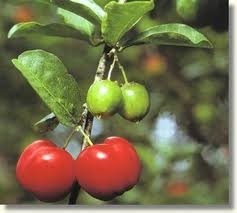Dispatches from HIE 2010
Cognis focuses on soft health claims for plant extracts

The firm presented pomegranate and acerola-based fruit powders in a lemon-flavoured water at HIE Madrid 2010 that extend its Plantalin plant extract range, and EMEA (Europe, the Middle East and Africa) junior marketing manager Andreas Bais told NutraIngredients.com why the firm was investing in superfruits.
“Acerola is high in Vitamin C, and we also see the superfruit trend in the marketplace, while pomegranate is high in unique antioxidants,” he said.“We have exclusivity for these unique antioxidants and it’s the perfect line extensions for our existing Plantalins.”
Cognis says that its acerola (the fruit of West Indian shrub malphighia glabra)powder is light yellow, contains around 1 to 4.5 per cent Vitamin C (where peeled oranges contain only around 0.05 per cent), is solvent-free, and soluble in aqueous media at ambient temperatures.
Where functional benefits go, the firm cites a study by Hanamura T. et al (2008) in Bioscience, Biotechnology and Biochemistry to bolster claims that Vitamin C strengthens the immune system, builds collagen cells, supports the respiratory system and has antioxidant effects.
Market awareness crucial
But given the current tough regulatory climate, Bais said Cognis was taking a “dual pillar” approach to product development and marketing, since he is “sure you will not get any [generic] 13.1 health claims for plant extracts [accepted by EFSA] at the moment”.
Consequently, he said that Cognis had conducted extensive market research and is instead stressing “market awareness” for the acerola extract’s advantages, since “as with omega-3 and ginseng it is not sold as having a strong health claim – it is sold because of awareness”.
Emotional perception was also crucial, he added. “We are working with concepts of ‘natural’, ‘sustainable’, although all these extracts have science behind them in terms of effects, so we do have references.”
Despite the need for marketing savvy, Bais insisted that Cognis has a “strong health claims” pillar within the business where positive EFSA health claim opinions remain crucial for products such as its Vegapure plant sterol range for cholesterol lowering and weight management ingredient Tonalin CLA (conjugated linoleic acid).
This statement reflects Cognis’ €10m investment in 2009 to build a new production facility for plant sterol esters in IIIertissen, Germany, which extended its existing Global Competence Centre for nutrition and health on the same site.
Beverage and dairy demand
Bais said that within EMEA Cognis was seeing most demand for its acerola fruit powder “in functional beverages, clear-water beverages and also dairy. We are able to put it into a lot of matrices – having tested it using different application, powder formats, etc.
“I would say that due to growth rates, future opportunities, usage and awareness these two are the main applications and delivery forms within the region.”
Cognis also mention confectionery as a potential market, and Bais also stressed potential within chewing gum, and premium lines in particular. “When you think of some of Orbit or Wrigley’s gum that now contains things like lemon balm, for instance, this could also fit, and is positive from our viewpoint.”
Cognis’ Plantalin range comprises six water-soluble plant extract powders that include acerola, pomegranate, aloe vera, lemon balm and ginseng.












